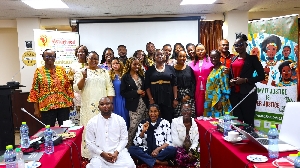 The participating journalists from across Africa with the AACJ and FEMNET team in Accra
The participating journalists from across Africa with the AACJ and FEMNET team in Accra
In a bid to foster a deeper understanding and promote African narratives on climate justice, the African Women's Development and Communication Network (FEMNET) recently organized a transformative media training session. This initiative, a pivotal component of the African Activists for Climate Justice (AACJ) Project, aimed to equip journalists from various African countries with the necessary tools to develop and disseminate information on climate-related issues through an African feminist lens.
Additionally, the training aimed to equip journalists with a feminist lens, enabling them to identify and amplify stories of African women disproportionately impacted by the climate crisis. By centering women's voices and experiences, journalists can contribute to a more nuanced understanding of climate justice issues and advocate for gender-responsive climate policies and interventions.
Held from April 10th to 11th, 2024, in Accra, Ghana, the training brought together 20 dedicated journalists who have been actively engaged in covering environmental and climate-related matters across the continent. Facilitated by experts in climate justice, gender equality, and media communication, the training delved into crucial topics essential for enhancing journalistic capacities in reporting on climate justice.
Among the key areas covered during the intensive training were:
1. Understanding Gender Policies and their Connection to Climate Change: Participants gained insights into the intersectionality of gender and climate issues, exploring how gender disparities exacerbate climate vulnerabilities and the importance of integrating gender perspectives into climate policies and interventions.
2. Strengthening Understanding of Climate Change Agreements: Journalists were equipped with comprehensive knowledge of international climate agreements, such as the Paris Agreement, and their implications for African countries. Understanding these agreements is crucial for holding governments and stakeholders accountable for their climate actions.
3. Climate Reporting and Advocacy for Accountability: Participants honed their skills in climate reporting, learning how to effectively communicate climate-related information to diverse audiences. Moreover, they delved into strategies for advocating for accountability on climate change laws and policies, empowering them to serve as watchdogs in their respective communities.
4. Amplifying African Feminist Voices on Climate Justice: The training emphasized the importance of elevating African feminist perspectives in climate discourse. Journalists explored ways to amplify voices of women, who are often disproportionately affected by climate change, and integrate feminist principles into their reporting to ensure inclusivity and equity.
5. Building a Collaborative Network for Feminist Climate Justice Communication: Recognizing the power of collaboration, participants were encouraged to forge networks and partnerships to strengthen feminist climate justice communication efforts across Africa. Building a supportive community of journalists committed to advancing climate justice narratives is essential for effecting meaningful change.
The training was enriched by the expertise of notable figures in the field of climate change in Africa, including Dr. Wambua Kituku, Dr. Melania Chiponda, Anne Tek, Jennifer Nkurunziza, and Agnes Oloo, whose invaluable contributions as facilitators elevated the learning experience for participants.
By the end of the training, participants emerged with enhanced skills, knowledge, and networks to effectively report on climate justice issues from an African feminist perspective. Armed with these invaluable resources, they are poised to drive positive change, raise awareness, and advocate for climate action in their respective countries and beyond.
Through initiatives like this media training, FEMNET and its partners are playing a crucial role in empowering journalists to contribute to the global discourse on climate justice and catalyze transformative action towards a sustainable and equitable future for all Africans.
The writer, Cedric Dzelu, is AACJ Youth Focal Person and Executive Director at Frontline for Climate Action. He can be reached via cedricdzelu@gmail.com